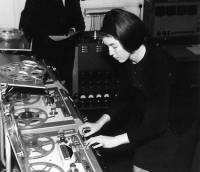Unit Delta Plus
| Delia Derbyshire | |
|---|---|

Delia Derbyshire at the BBC Radiophonic Workshop
|
|
| Background information | |
| Birth name | Delia Ann Derbyshire |
| Born |
5 May 1937 Coventry, England, United Kingdom |
| Died | 3 July 2001 (aged 64) Northampton, England, UK |
| Genres | Electronic music |
| Occupation(s) | Composer |
| Years active | 1959–2001 |
| Associated acts | White Noise, Unit Delta Plus |
| Website | delia-derbyshire |
Delia Ann Derbyshire (5 May 1937 – 3 July 2001) was an English musician and composer of electronic music and musique concrète. She is best known for "creating a howling masterpiece" in her electronic music arrangement of Ron Grainer's written theme music to the British science fiction television series Doctor Who and for her pioneering work with the BBC Radiophonic Workshop.
Derbyshire was born in Coventry, daughter of Emma (née Dawson) and Edward Derbyshire. of Cedars Avenue, Coundon, Coventry. Her father was a sheet-metal worker. She had one sibling, a sister, who died young. Her father died in 1965 and her mother in 1994.
During the Second World War, immediately after the Coventry Blitz in 1940, she was moved to Preston, Lancashire for safety. Her parents had moved from there originally and most of her surviving relatives still live in the area. She was very bright and, by the age of four, was teaching others in her class to read and write in primary school, but said "The radio was my education". Her parents bought her a piano when she was eight years old. Educated at Barr's Hill Grammar School from 1948 to 1956, she was accepted at both Oxford and Cambridge, "quite something for a working class girl in the 'fifties, where only one in 10 [students] were female", winning a scholarship to study mathematics at Girton College, Cambridge but, apart from some success in the mathematical theory of electricity, she claims she did badly. After one year at Cambridge she switched to music, graduating in 1959 with a BA in mathematics and music, having specialised in medieval and modern music history. Her other principal qualification was LRAM in pianoforte.
She approached the careers office at the university and told them she was interested in "sound, music and acoustics, to which they recommended a career in either deaf aids or depth sounding". Then she applied for a position at Decca Records, only to be told that the company did not employ women in their recording studios. Instead, she took positions at the UN in Geneva, from June to September, teaching piano to the children of the British Consul-General and mathematics to the children of Canadian and South American diplomats. Then from September to December, she worked as an assistant to Gerald G. Gross, Head of Plenipotentiary and General Administrative Radio Conferences at the International Telecommunications Union. She returned to Coventry and from January to April 1960 taught general subjects in a primary school there. Then she went to London where from May to October she was an assistant in the promotion department of music publishers Boosey & Hawkes.
...
Wikipedia
